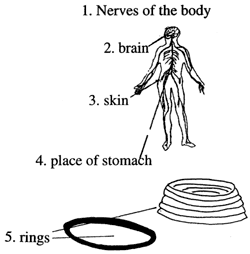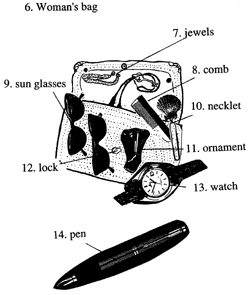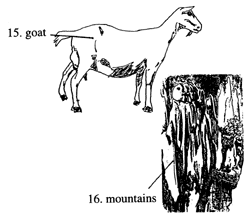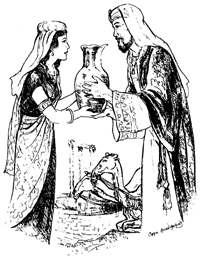Unit 20: Negation With -un
Pictured Words
New Words

| 1. nerve
|
| 2. brain
|
| 3. skin
|
| 4. place of stomach
|
| 5. rings
|

| 6. woman's bag
|
| 7. jewels
|
| 8. comb
|
| 9. sun glasses
|
| 10. necklet
|
| 11. ornament
|
| 12. lock
|
| 13. watch
|
| 14. pen
|

| 15. goat
|
| 16. mountains
|
Nouns
Adjectives
Sayings
Our nerves keep up their development whilst we are living.
It is unusual to have weak nerves.
A goat is unable to make adjustments to wet weather.
Sheep can do so any time because they have oil on their coats.
It is often uncertain just what is in a woman's bag.
She may have a ring on her finger but ornaments in her bag.
The ring on her finger may be loose or it may be tight.
I am unable to see the mountains from here.
In those mountains there is unending silver and gold.
I am writing the news of it with my new pen.
Negation With -un
There are many words that take the opposite sense when “-un” is put before them.
A full list would be too long to say here.
It is enough to have the examples below and to keep in mind that any word with “-un” before it may become opposite in sense.
In this list, the two opposites are placed before each example.
| unable
| unable to say any evil of us
|
| unchanged
| keep your faith in the Lord unchanged.
|
| unclean
| that our way of life be not unclean but holy clean.
|
| uncertain
| i am running, not uncertainly.
|
| uncontrolled
| uncontrolled drinking and feasting.
|
| unending
| news of the unending wealth.
|
| unhappy
| the wife did everything possible to make her unhappy.
|
| unkind
| with all unkind acts.
|
| unnoted
| unnoted, but still kept fully in mind pleasing.
|
| unpleasing
| who are unpleasing to God and against all men.
|
| unwise
| living, not as unwise but as wise.
|

She Gave Him A Drink
The servant took ten of his master's camels, and all sorts of good things of his master's, and went to Mesopotamia, to the town of Nahor.
And he made the camels take their rest outside the town by the water-spring in the evening, at the time when the women came to get water.
And he said, O Lord, the God of my master Abraham, let me do well in what I have undertaken this day, and give your mercy to my master Abraham.
See, I am waiting here by the water-spring;
and the daughters of the town are coming out to get water:
Now, may the girl to whom I say, Let down your vessel and give me a drink, and who says in answer, Here is a drink for you and let me give water to your camels: may she be the one marked out by you for your
And even before his words were ended, Rebekah, the daughter of Bethuel, the son of Milcah, who was the wife of Nahor, Abraham's brother, came out with her water-vessel on her arm.
She was a very beautiful girl, a virgin, who had never been touched by a man: and she went down to the spring to get water in her vessel.
And the servant came running to her and said, Give me a little water from your vessel.
And she said, Take a drink, my lord: and quickly letting down her vessel onto her hand, she gave him a drink.
And having done so she said, I will get water for your camels till they have had enough.
And after putting the water from her vessel into the animals' drinking-place, she went quickly back to the spring and got water for all the camels.
And the man looking at her, said nothing, waiting to see if the Lord had given his journey a good outcome.
Additional Reading
It was quite normal for a man to be married to his near relative in the days of Abraham.
The purpose of this was to keep together the property of the wider family.
So, it was natural to send his truest, most dependable servant all that long way to his family's own country.
And it was a very long journey because the only way was north to the mountains, along them eastwards and then south to the land of Mesopotamia.
This round-a-bout way was taken to keep clear of the large dusty and dry land in between that made any journey dangerous.
So, the servant made a very long, hard journey when he was given authority to go looking for a wife for his master's son.
We see that the servant was a deeply religious man.
He put a question to God to get his agreement to the purpose of his journey.
He did not make his own decision.
He made an attempt to see what God's purpose might be.
His request was given an answer at once.
Not only did a very beautiful girl come to the spring to get water in her vessel, but also she was a near relative.
Rebekah was the daughter of Abraham's brother.
Her name had a special quality, as did the names of every person then.
It does not have much attraction to us now.
it is sense was that of a twisted cord for putting a grip on the leg of a young animal.
We see no point in that action now, but in those days it was a tricky thing to do.
It said that a person had great ability if her name was Rebekah, for that readily gave the idea that she could quickly get hold of a young goat and put him in a safe pen for the night.
A young woman would always have that work to do.
It also had another sense and that was that she was a person who had herself been taken into God's grip and so had his guidance.
Both things were equally important.
Rebekah did show that she was quick and active at this stage of the servant's journey.
She gave water to all his camels.
That was a very responsible and expert thing to do because camels must take up a lot of water.
The servant's camels would have a strong desire for a drink after such a long journey.
And she was experiencing God's guidance even though she had no knowledge of it.
She was about to be given the chance to be married to a respected and good man.
That was something all girls would be happy about.
The servant came back to the family tent and said to her father that God had led him on his journey.
He then gave Rebekah beautiful robes, and ornaments of lovely jewels of silver and rings of solid gold.
He said to her father, "Now say if you will do what is good and right for my master or not."
So it was that Rebekah was given by her father to the servant at that hour to take that long journey of many weeks duration.
But, she came to a future marriage in a far distant land and made her own household there.
It must have taken a lot of nerve for her to do that.
It would give her the feeling of facing great danger.
But we now know that she became a respected woman.
She was the mother of two sons to whom she gave birth at the same time.
They became the fathers of two great nations who are still with us today.
Helpful Notes
| servant
| one who obeys orders.
|
| Mesopotamia
| a group of countries west of Palestine.
|
| water-spring
| a place where water comes into the ground.
|
| mercy
| showing kindness.
|
| vessel
| for getting water, as from a well.
|
| master
| one who has control.
|
| outcome
| what finally happens.
|
| round-a-bout
| following a part of a circle attraction
| being drawn towards.
|
| pen
| used here as, a place to keep animals in.
|
| nerve
| a strong state of mind.
|
Interesting Facts And Records
It is said that even today there are fourteen thousand uses for salt.
So, it is a very important substance.
In early times it was even more important.
It was used for making leather, for keeping fish fresh, and even to give to soldiers as money for their service.
It was stored in watched houses and its transport was an operation under danger from armed attack.
Salt is seen to be important in the words of Jesus, "You are the salt of the earth; but if its taste goes from the salt, how will you make it salt again?
It is then good for nothing but to be put out and be crushed under foot by men".
This saying has special relations to the scale of values in society at that time.
Jesus was using a very valuable substance to make a point in His teaching.
Lot's wife is said to have become "a pillar of salt" at the destruction of Sodom.
The meal offerings in the tabernacle were to be "salted with salt" if they were to have God's approval.
We are told by the Apostle Paul to "let your talk be with grace, mixed with salt".
Salt was both a protection for food to keep it from going bad and a chemical substance to give it a pleasing taste.
The need for salt is great.
Salt makes up almost 1 part in 100 of the blood of our bodies so without it we cannot live and work.
Salt is easily lost under wet conditions.
In the rain forests of Africa men have a strong desire for the salt which has been washed away by the rain.
They make long journeys to the sea to get it and are often taken into forced service by others along the way.
They are in great danger on that journey, but they must have salt.
Salt was under government control in China for two thousand years.
It was used as a form of tax in that nation for all that time.
Poor persons could not give the tax and became ill from not being able to get salt to digest their food.
All this makes it very clear that Jesus used a weighty argument in his teaching when he likened his followers to salt in the earth.
He was saying that they would be a balance for the ills of society.
He wanted them to have a responsible place in every experience of life and not to have a narrow self centred existence.